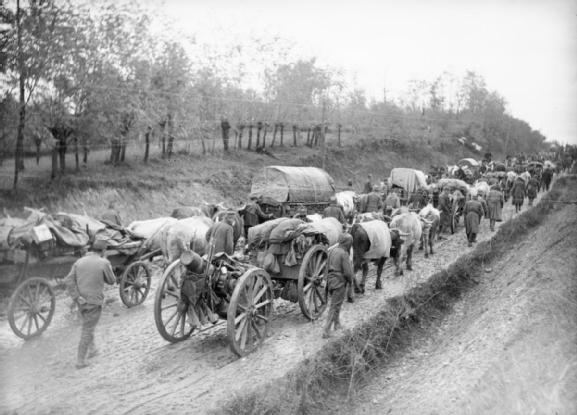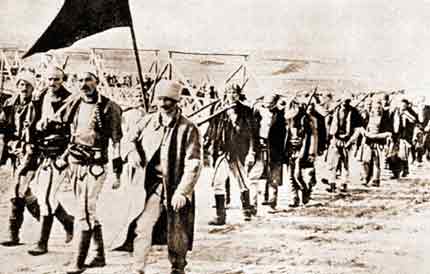Austrian, Bulgarian Armies Drive Serbs from their Home;
They Die from Bombardment, Hunger, Disease.
Special to The Great War Project.
(30 October-3 November) The situation for the Serbs is turning calamitous.
At this moment a century ago, Serbia is under attack from the forces of Austria-Hungary to the north, and Bulgaria from the east.
The Serbs need help, and British and French forces are trying to bring support. The British are moving troops from the stalemated front on the western Turkish peninsula of Gallipoli. The British land at the Greek port of Salonica, but their progress is too slow, writes historian Martin Gilbert.
In a letter, one British officer reports: “You’ll probably ask why we don’t get on, but there’s a very good reason, their strong position and our not enough men.”
The weather is terrible. According to the same officer, “All our moves have been done in inky blackness and usually under rain and on very ill-defined tracks in the hills.”
The Bulgarian military is pressing the full force of its army against the Serbs, with great success.
If the Bulgarians accomplish their goal – if the Serbs fail to put up a serious defense – Serbia will be forced to relinquish its section of the Berlin-to-Baghdad railway, and give the Germans a direct rail link between Berlin and Constantinople, the Ottoman capital.
“The Serbian armies fought tenaciously,” reports Gilbert. “regaining villages and holding up the advancing armies, but being steadily driven back.”
“For every fifty shells in Austria’s advancing artillery, the Serbs had only one with which to reply, and their gunners received a stream of orders not to waste them, and then only to use them in emergency.”
“Burning their last motorized vehicles and heavy guns,” writes Gilbert, 200,000 Serbian civilians begin a withdrawal of a hundred miles across the mountains seeking sanctuary in Albania.
The retreat will take weeks, “over rough terrain,” expected to exact a terrible toll. “The march across the mountains was a saga of distress, with hunger, privation, and disease adding to the difficulties of the harsh terrain.”
The Serb marchers “face another grim hazard,” reports Gilbert. “Albania had declared itself for the [Allies] and offered help to the Serbs. But Albanian tribesmen who had suffered at Serb hands [in earlier conflicts] attacked the columns and killed hundreds of the marchers.”
In addition, “although they were fleeing for their lives, the Serbs take with them into the mountains of Albania more than 24,000 Austrian prisoners-of-war.” Many will die from typhus and cholera.
The ultimate goal of the withdrawal is the Albanian coast where Serb civilians and soldiers alike can be evacuated to the Greek island of Corfu and other Greek and Italian ports. Ultimately, the evacuation will involve more than a thousand runs by over eighty Italian, French, and British ships.
Ten-thousand horses must also be evacuated.
The living conditions in Corfu for the Serb refugees are terrible, and thousands cannot survive, dying of hunger and pestilence.
And if that were not enough reports Gilbert, “hundreds more were killed by Austrian air bombardment while waiting for the evacuation ships.”
“The war of embattled armies had also become a war of prisoners-of-war, of forced marches, of refugees, and of orphans.”


